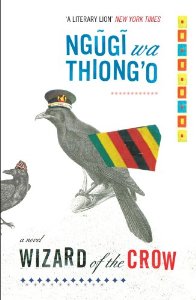“There were many theories about the strange illness of the second ruler of the free republic of Aburiria, but the most frequent on peoples lips were five.” Thus began Ngugi wa Thiong’o’s 800 pages of fantastic fable on African leadership. It takes a very long time to complete it. However reading this book is a worthy investment. The satirized incompetence and ridiculousness of the main character cleverly named ‘the ruler’ could be compared to many of the hundreds of dictators that Africa had been cursed with over the last 50 years of independence. I was stuck guessing if wa Thiong’o was describing Mugabe, or perhaps Moi? It could have been the Nigerian Abacha or even Gaddafi with his ramblings and ludicrous attempts to create a philosophical school of thought in Libya. I played the game I called “recognize the despot” throughout the reading of the book. It was great fun.
The story is certainly worth telling and it was told well. It was as if I was locked in a maze whose corners were filled with magical moments and terrifying intrigue. It was a funny book, filled with often-sad characters. The one that struck me the most as sympathetic was the very continent the book so expertly described. The Wizard of the Crow successfully captured all the glory and gore of the “last 20th century” of African development. One can also call it a love story, a feminist manifesto of the African persuasion, a realistic tale of daily African struggles. Its genius is in the fantastical plot twists, and the logic in which each character manages to be illogically and absurdly insane often with terrible yet hilarious consequences. The more jarring developments are written in such gentle flow that made the story soothing and inevitable. . Above all, the book was biting and damning.
In the end, all I felt was a profound sadness. The picture painted showed just how much work it will take for this beloved continent to rise above the decay that was wrought over the last 50 years. I was aware of all the incredible odds that are stacked against success for the everyday African and the great work that it will take to alleviate African suffering. This novel is described as satire but one cannot shake the nagging feeling that it really isn’t. The ruler is Mugabe, Gaddahfi and all the others.

